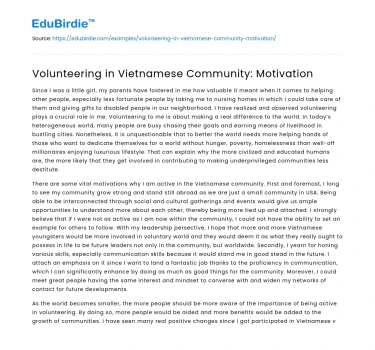Introduction
Volunteering is a multifaceted phenomenon that functions as a cornerstone of societal development and cohesion. In the Vietnamese community, volunteering has deep cultural roots, intertwined with traditional values and the spirit of collectivism. This essay explores the motivations driving individuals to engage in volunteer activities within the Vietnamese context, an area that has gained significant interest in recent years. Various factors, ranging from cultural influences and personal development to social recognition, shape the volunteer landscape in Vietnam. Understanding these motivations not only provides insights into the socio-cultural fabric of Vietnamese society but also aids organizations in effectively harnessing volunteer efforts. This exploration will delve into the intrinsic and extrinsic motivators that drive Vietnamese individuals to volunteer, evaluate the interplay of cultural values with volunteering, and address the challenges and counter-arguments related to volunteer motivation. Through this examination, the essay aims to present a comprehensive understanding of why volunteering achieves such prominence in Vietnam.
Cultural Influences and Intrinsic Motivation
Cultural values play a pivotal role in shaping the motivation to volunteer within the Vietnamese community. Deeply embedded in Vietnamese society are the principles of "nhân nghĩa" (humanity and morality) and "tình làng nghĩa xóm" (community solidarity), which encourage individuals to contribute to the welfare of their communities. These intrinsic motivations often stem from the desire to maintain harmony and to fulfill moral obligations that are culturally revered. According to a study by Nguyen et al. (2020), over 60% of Vietnamese volunteers cited cultural and moral obligations as primary motivators for their involvement in community service. Such motivations are reflective of the Confucian influence that emphasizes duty towards family and society.
Save your time!
We can take care of your essay
- Proper editing and formatting
- Free revision, title page, and bibliography
- Flexible prices and money-back guarantee
Additionally, intrinsic motivations are fueled by personal development opportunities that volunteering provides. Many volunteers report that their engagement allows them to gain new skills, improve self-esteem, and achieve personal growth. For instance, young Vietnamese often view volunteering as a chance to develop leadership skills and enhance employability. This is evident in the increasing participation of university students in volunteer programs, where they seek to broaden their horizons and gain practical experience. As Tran (2018) highlights, volunteering serves as an educational tool, offering experiential learning that complements academic knowledge.
Extrinsic Motivation and Social Recognition
While intrinsic motivators play a significant role, extrinsic factors such as social recognition and career advancement also drive volunteer participation in Vietnam. The social structure in Vietnam places high value on community acknowledgment and respect, which can be garnered through voluntary service. Engaging in volunteer activities often enhances one’s social standing and provides a platform for establishing valuable connections, which can be pivotal in career progression. As highlighted by Pham (2019), many professionals in Vietnam engage in volunteering as a strategic move to widen their networks and gain favor in their professional circles.
Moreover, government and organizational incentives can amplify these extrinsic motivations. The Vietnamese government and various NGOs frequently recognize and reward volunteer contributions through awards, certificates, and public acknowledgment, which serve as tangible incentives for participation. However, it is crucial to consider that reliance on extrinsic motivation may sometimes overshadow the altruistic nature of volunteering. Critics argue that when volunteering becomes a means to an end, its essence as a selfless act is compromised. Nevertheless, the blend of intrinsic and extrinsic motivators creates a robust framework that sustains high levels of volunteer engagement in Vietnam.
Challenges and Counter-Arguments
Despite the strong cultural and social motivations for volunteering in Vietnam, several challenges and counter-arguments exist that merit consideration. One prominent challenge is the potential for volunteer burnout, a condition exacerbated by high expectations and the pressure to meet cultural obligations. According to a survey conducted by the Vietnam Volunteers Association (2021), nearly 30% of volunteers reported experiencing stress and fatigue due to overwhelming responsibilities. This phenomenon calls into question the sustainability of intrinsic motivation when volunteers face significant personal sacrifices.
Furthermore, the argument that extrinsic rewards might dilute the genuine spirit of volunteering cannot be ignored. Critics suggest that when individuals volunteer primarily for recognition or career benefits, it may undermine the authenticity of their service. Nonetheless, it is essential to acknowledge that motivations are often complex and multi-layered, with volunteers balancing personal gain with a genuine desire to contribute to society. By addressing these challenges and fostering an environment that supports both intrinsic and extrinsic motivations, organizations can enhance the impact and sustainability of volunteer efforts.
Conclusion
In conclusion, the motivations for volunteering in the Vietnamese community are deeply rooted in cultural values and societal structures. Intrinsic motivations such as cultural duty and personal growth play a significant role, while extrinsic factors like social recognition and career benefits also influence volunteer engagement. Despite challenges such as volunteer burnout and potential conflicts of interest, the combination of these motivators creates a vibrant volunteer culture in Vietnam. By understanding and addressing these motivations, organizations can better harness volunteer efforts to achieve social cohesion and community development. The Vietnamese model of volunteering offers valuable lessons in balancing traditional values with modern incentives, highlighting the importance of a holistic approach to volunteer motivation.






 Stuck on your essay?
Stuck on your essay?

